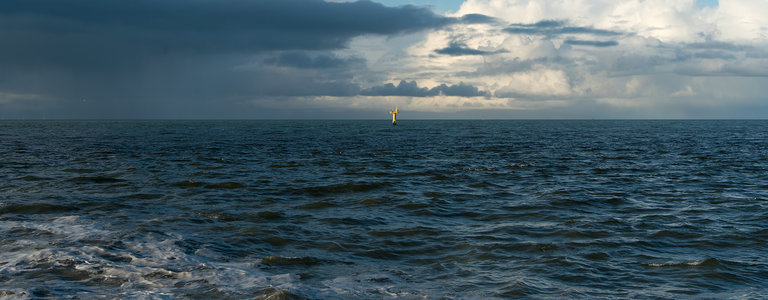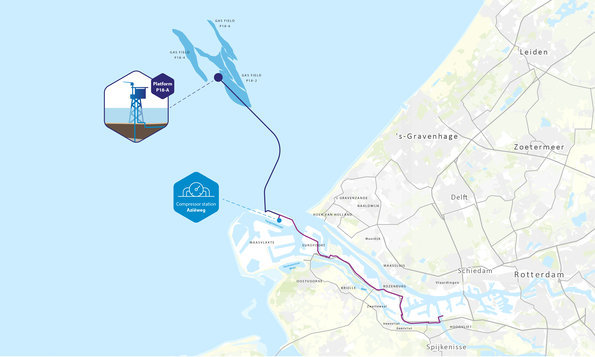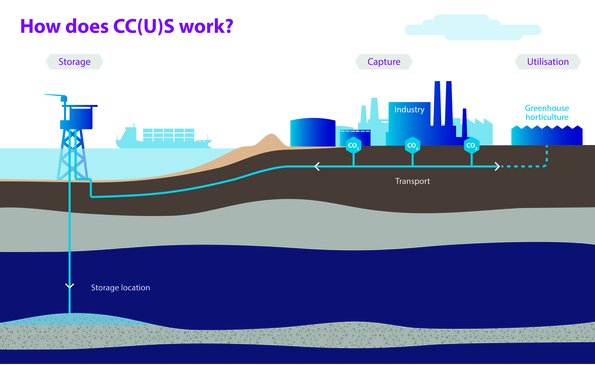
Project Porthos: CO2-Storage under the North Sea
Work on the implementation of one of the world’s most ambitious carbon capture and storage (CCS) projects is currently underway at the port of Rotterdam. The objective of the project is to compress roughly 2.5 million metric tons of CO2 per year and store it in empty gas fields beneath the North Sea. The project has a considerable signal effect for other carbon capture and storage projects throughout Europe.
Preliminary preparations have been completed, but the final investment decision has yet to be made: a unique carbon capture and storage project will be implemented in the port of Rotterdam. The name of the project is “Porthos”, the abbreviation for “Port of Rotterdam CO2 Transport Hub and Offshore Storage”. The infrastructure that will be built by Porthos will ensure that around 2.5 million tons of CO2 generated in the Rotterdam port area will be compressed and stored every year from 2025/2026. The port of Rotterdam is ideally suited for this ambitious project. This assessment is based on the fact that around 14 percent of all CO2 emissions in the Netherlands are generated in the vicinity of the port. Porthos should succeed in reducing these emissions by approximately 10 percent. There are also empty gas fields in the North Sea around 20 kilometers from the port where the CO2 can be stored.
Storage below the Seabed
Specifically, the transport and storage of the emissions by the project’s initiators, EBN (Energie Beheer Nederland), Gasunie and the Port of Rotterdam Authority, is planned as follows: The CO2 will be supplied by Air Liquide, Air Products, ExxonMobil and Shell. These companies will capture it at their industrial facilities near Rotterdam and feed it into a pipeline that runs through the port of Rotterdam. The CO2 will then be routed through a compressor station into an offshore pipeline below the seabed and transported to a platform in the North Sea about 20 kilometers offshore. From this platform, the CO2 will be pumped into empty gas fields located in a closed reservoir more than three kilometers below the North Sea bed.
From a strategic perspective, our involvement in the Porthos project is extremely important for us."
"In September 2022, final storage permits were granted for the storage of CO2 in empty gas fields under the North Sea”, says Myrna Fraters, communications advisor at Porthos. “This makes fields P18-2 and P18-4 the first fields in the Netherlands in which CO2 can be permanently stored. An important milestone for Porthos!” It is expected, however, that the realization of the project will be delayed by several months. As is common with projects of this magnitude and the use of innovative technologies, there are still legal issues to be clarified and these are currently being investigated thoroughly.
Years of preparation
Construction of the necessary infrastructure will begin as soon as the final investment decision has been made. The European Union has already recognized Porthos as a project of common interest and has granted funding of €102 million. According to current plans, the infrastructure is scheduled to go into operation in 2025/2026 at which point the capture and storage of CO2 will begin.
A number of companies have been involved in the development of the planned infrastructure and Bilfinger is one of them. The company has been delivering support services for two years, including the preparation of a process simulation study, detailed planning for buildings at the compressor station and engineering of piping systems. “From a strategic perspective, our involvement in the Porthos project is extremely important for us. We can once again demonstrate that our services from a single source generate a high degree of added value across the entire value chain”, says Thomas Schulz, Group CEO of Bilfinger.



